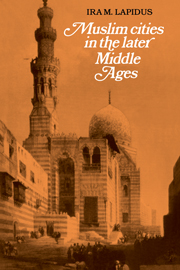Book contents
- Frontmatter
- Contents
- PREFACE
- INTRODUCTION
- CHAPTER I A HISTORY OF CITIES IN THE MAMLUK EMPIRE
- CHAPTER II THE MAMLUK REGIME IN THE LIFE OF THE CITIES
- CHAPTER III THE URBAN SOCIETY
- CHAPTER IV THE POLITICAL SYSTEM: THE MAMLUK STATE AND THE URBAN NOTABLES
- CHAPTER V THE POLITICAL SYSTEM: THE COMMON PEOPLE BETWEEN VIOLENCE AND IMPOTENCE
- CHAPTER VI CONCLUSION: SOCIETY AND POLITY IN MEDIEVAL MUSLIM CITIES
- BIBLIOGRAPHICAL NOTES
- INDEX
CHAPTER VI - CONCLUSION: SOCIETY AND POLITY IN MEDIEVAL MUSLIM CITIES
Published online by Cambridge University Press: 24 November 2009
- Frontmatter
- Contents
- PREFACE
- INTRODUCTION
- CHAPTER I A HISTORY OF CITIES IN THE MAMLUK EMPIRE
- CHAPTER II THE MAMLUK REGIME IN THE LIFE OF THE CITIES
- CHAPTER III THE URBAN SOCIETY
- CHAPTER IV THE POLITICAL SYSTEM: THE MAMLUK STATE AND THE URBAN NOTABLES
- CHAPTER V THE POLITICAL SYSTEM: THE COMMON PEOPLE BETWEEN VIOLENCE AND IMPOTENCE
- CHAPTER VI CONCLUSION: SOCIETY AND POLITY IN MEDIEVAL MUSLIM CITIES
- BIBLIOGRAPHICAL NOTES
- INDEX
Summary
In this study I have tried to examine the configuration of elements out of which the social and political life of Muslim Arab cities was built. The complexity of this pattern rises not only from diversity of classes and interests, but also from the various mechanisms by which city life was organized. Traditional social forms of action existed side by side with voluntary purposive associations. Legal and adjudicated norms were found together with rights and responsibilities ascribed by tradition and status. Bureaucratic organization and patronage-clientage bonds were simultaneously means of government. These forms are found in both Muslim and European cities, but the differences between European and Muslim towns cannot be summed up in the dichotomy of communes versus bureaucracy. Communes did not embrace all of the public life of European cities any more than the Mamluk state excluded all associational life. The commune should not conjure up images of democratic harmony, nor should the term “oriental despotism” evoke images of spiritless and prostrate towns.
European and Muslim urban societies had by the late middle ages evolved two differing over-all urban social configurations. Muslim society tended to be relatively undifferentiated. The innumerable roles which must be played in any functioning society were not the responsibility of specialized persons or agencies. All of the crucial political, economic, cultural, and religious roles of the society were entrusted to a broad and undivided class of professional, religious, and commercial notables.
- Type
- Chapter
- Information
- Muslim Cities in the Later Middle Ages , pp. 185 - 191Publisher: Cambridge University PressPrint publication year: 1984



